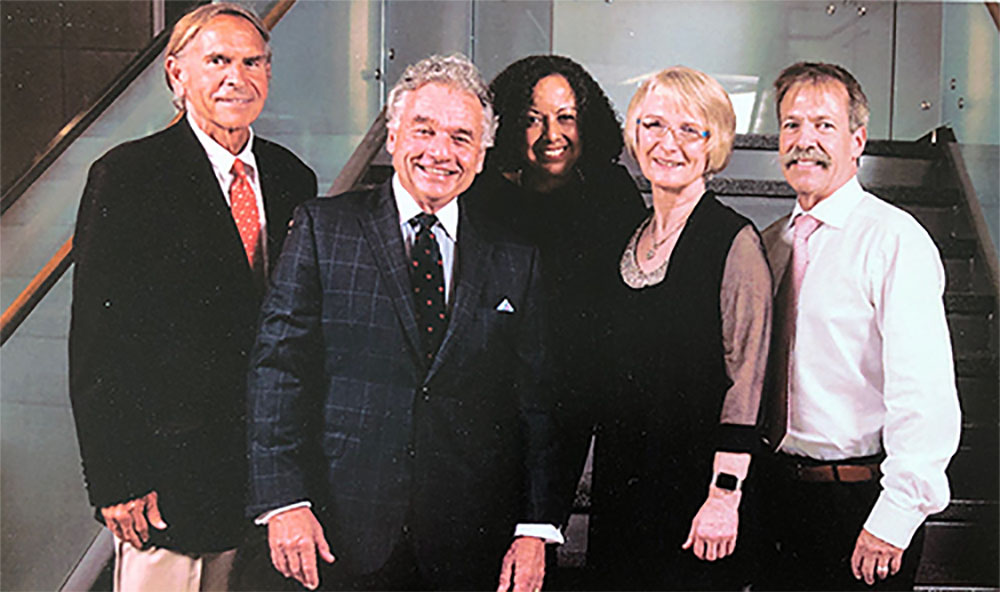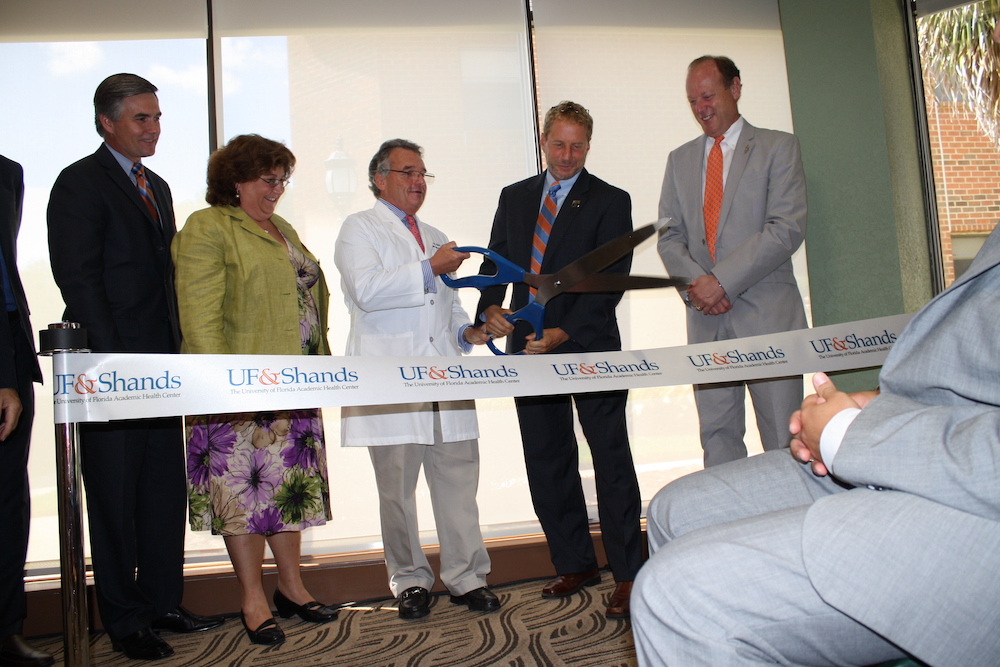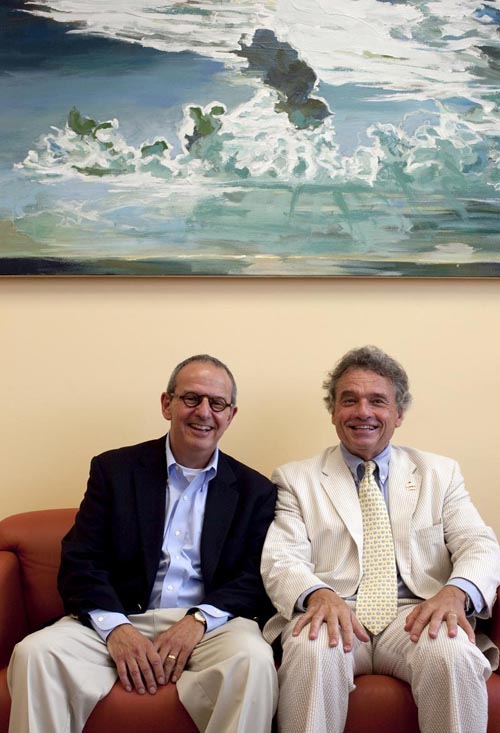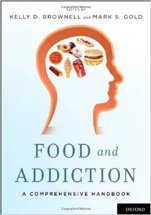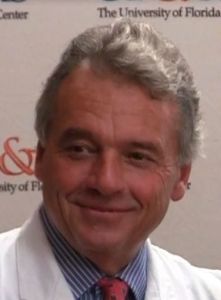
Dr. Mark Gold is an inventor, pioneering translational researcher, Eminent Scholar, Distinguished Professor, & Chairman whose career in translational neuroscience began in 1972. His theories have changed the field, stimulated research, and led to new treatments. Gold, while at the YSOM, proposed a novel brain mechanism and changes to explain opioid dependence and withdrawal, and discovered the anti-withdrawal efficacy of alpha-2 adrenergic agonists-clonidine and lofexidine. With his Yale colleague & mentor Herb Kleber, Gold helped change addiction psychiatry to disease management, evidence-based care with MATs, and evaluation & treatment of co-occurring disorders. He has made major contributions to Naloxone in overdose and Naltrexone and agonist therapies in OUD. Gold’s work proved that cocaine caused a relative dopamine deficiency, anhedonia & was addicting Gold pioneered the study of second-hand tobacco, cannabis, and opium smoke. Gold and Kelly Brownell co-chaired the historic Yale Conference on Food and hedonic overeating and the Oxford University Press textbook. Over his 25-year career at the University of Florida, he was a Professor of Neuroscience, physician-scientist at UF McKnight Brain Institute, and University bench-to-bedside leader. He became a UF Distinguished Professor, Eminent Scholar & Chairman of the Department of Psychiatry. He was awarded an innovator award from UF President as a translational researcher and inventor for work on Xhale Assurance’s disposable pulse oximetry ala sensor, which Philips acquired in 2018. Dr. Gold was a Founding Director of the MR-guided radiation oncology pioneer Viewray and AxoGen, the nerve recovery and repair platform. Since his retirement, Gold has continued his work as a researcher, mentor, and inventor working at WUSTL. Translating scientific progress to help patients, he worked with ADAPT Pharma on naloxone and naltrexone culminating in a HEAL grant to develop longer-acting formulations. He is on the BOD of education, intervention, and prevention organizations, including CADCA. ASAM presented Gold with the McGovern ” Annual Award for highly meritorious contributions … Lifetime pioneering work”. Dr. Gold has received the APA’s Foundation Fund Award, APF’s Pillar of Excellence, DEA & NAATP’s Lifetime Achievement Award for Research, and Distinguished Alumni Awards from Yale, WUSTL, and the University of Florida. He was a Founding Editor of the Journal of Addiction Medicine & UpToDate. Currently, the Specialty Chief Editor of SUDs and Behavioral Addictions in Frontiers in Public Health.
Since his retirement as a full-time academic in 2014, Dr. Mark Gold has continued his teaching, mentoring, research, and writing as a University of Florida Emeritus Eminent Scholar, Adjunct Professor in the Department of Psychiatry at Washington University and an active member of the Clinical Council at the Washington University School of Medicine’s Public Health Institute. With Kelly Brownell, he has updated their ground-breaking Food and Addiction by Oxford University Press for a paperback edition and is currently working on updates and revisions for a Second edition. He has analyzed and presented epidemiological research on the opioid and emerging cocaine epidemics. He has written and lectured on responses to reduce overdose deaths, medication assisted therapies and opioid use disorders. He regularly lectures at Medical Schools, Grand Rounds and national scientific meetings on opioids, cocaine and the bench-to-bedside science in eating disorders, obesity, reward deficiency syndrome, and addictions.
WATCH LIVE STREAM MAY 8, 2022: THE MARK S. GOLD, M.D. ’75, DISTINGUISHED PROFESSOR AND ALUMNUS WHITE COAT CEREMONY
Dr. Gold was the Founder of University of Florida’s Florida Recovery Center in Gainesville. He was the mentor and trained the current Medical Director, Scott Teitelbaum, M.D.
Dr. Gold is a teacher of the year, researcher and inventor who has worked for over 40 years to develop models for understanding the effects of tobacco, cocaine, opiates and other drugs and also food on the brain and behavior. As an inventor, Dr. Gold’s work has resulted in many patents, from his first, clonidine use in opioid withdrawal to his most recent on the use of anti-addiction medications in the treatment of hedonic overeating and the use of central site photoplethysmography, medication Administration and Safety Granted in 2018.
Dr. Gold has developed translational research models which have led to new treatments for addicts. His theories for addiction and also withdrawal are the current theories. His treatments are still in widespread worldwide use. He has been recognized many times for his pioneering research, innovations and also as an inventor.
Dr. Gold was actively involved in the Brain Institute’s evolution from an idea to reality. He was the first Faculty in the Division of Addiction Medicine and the first Chief of the Addiction Medicine at the University of Florida College of Medicine.
Clinical Interests
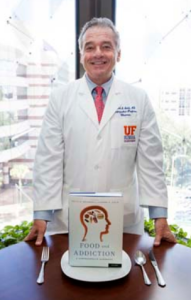
Dr. Mark S. Gold Introducing his Book, “Food and Addiction: A Comprehensive Handbook”
Dr. Gold’s pioneering work on the brain systems underlying the effects of opiate drugs led to a dramatic change in the way opiate action was understood. He proposed a novel model for opiate action, dependence, and withdrawal. This locus coeruleus theory of opiate and drug withdrawal is a mainstay of 2014 theory and practice, even though he proposed it in 1978. Dr. Gold was then the senior author on the discovery paper and was awarded a patent for the discovery of new uses for clonidine (Catapres) which remains widely used for opiate withdrawal and pain management. Dr. Gold and Herbert Kleber were the first to suggest sequential use of clonidine and Naltrexone as well as rapid detoxification and also post-detox maintenance with Naltrexone. During the mid-1980s Gold and colleagues developed a new theory for cocaine action, cocaine dependence, and cocaine withdrawal in the dopamine-rich areas of the brain. Dr. Gold and his colleagues proved that cocaine was addicting and this work led to a focus on dopamine and pleasure rather than norepinephrine and withdrawal. While most at the time did not consider cocaine addictive because of the lack of a classic withdrawal syndrome, Dr. Gold proposed a dopamine theory of pathological attachment, loss of control and addiction.
Dr. Gold’s original 1984-1985 work on cocaine led to a complete change in thinking about cocaine’s addiction liability, acute and chronic actions. This work re-defined addiction and moved the field toward fatal attraction, brain hijacking and loss of control rather than abstinence symptom or signs basis. He helped focus and mentor many researchers and clinicians on dopamine and deficiency states, including current NIDA Director Nora Volkow, M.D. The dopamine hypothesis and the role of dopamine in drug reinforcement are the mainstay of current drug addiction theory. Dr. Gold also had the first report of crack cocaine smoking in the literature.
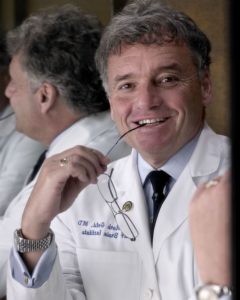 In addition to theory, Dr. Gold’s research has laid the foundation for the subsequent studies cementing the neuroanatomy of withdrawal and also dependence or addiction. His work reduced stigma and changed treatment. Dr. Gold has been listed as one of the Best Doctors® in America, U.S. News Best Doctors (2014). Dr Gold is also proud of starting the Division of Addiction Medicine, its ASAM and ABAM training and its treatment program, the Florida Recovery Center. Dr. Scott Teitelbaum was one of Dr. Gold’s first Fellows. Teitelbaum is currently Professor, University of Florida College of Medicine, Medical Director of the UF Health Florida Recovery Center (FRC) and Chief of The Division of Addiction Medicine FRC, with outpatient offices in Orlando, Tampa, Jacksonville, Vero Beach, and Gainesville
In addition to theory, Dr. Gold’s research has laid the foundation for the subsequent studies cementing the neuroanatomy of withdrawal and also dependence or addiction. His work reduced stigma and changed treatment. Dr. Gold has been listed as one of the Best Doctors® in America, U.S. News Best Doctors (2014). Dr Gold is also proud of starting the Division of Addiction Medicine, its ASAM and ABAM training and its treatment program, the Florida Recovery Center. Dr. Scott Teitelbaum was one of Dr. Gold’s first Fellows. Teitelbaum is currently Professor, University of Florida College of Medicine, Medical Director of the UF Health Florida Recovery Center (FRC) and Chief of The Division of Addiction Medicine FRC, with outpatient offices in Orlando, Tampa, Jacksonville, Vero Beach, and Gainesville
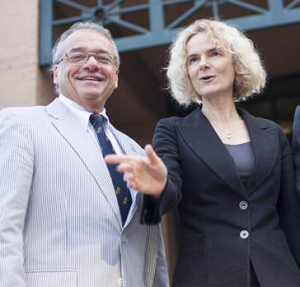
Mark S. Gold, M.D. & Nora D. Volkow, M.D., Director, National Institute of Drug Abuse (NIDA)
Dr. Gold, a Distinguished Fellow of the American College of Pharmacology and the American Psychiatric Association, has made many recent contributions to the understanding of smoking, the second hand effects of all drugs that are smoked and the consequences of expired medications. Dr. Gold and colleagues have recently reported on children of Kabul opium smokers and also outcomes of Impaired Health Professionals, especially anesthesiologists and other physicians. Second-hand drug exposure, like second hand tobacco smoke, is being actively investigated in self-administration, fMRI, and proteomic studies in UF’s addiction research group. Dr. Gold has a career-long interest in clinical hypothesis- driven research as well as research that starts in the lab and progresses to the bedside. He has worked to explain why people drink so much decaffeinated coffee —it’s not caffeine free — and why some patients who have abused drugs do not recover or return to pre morbid neurological function once they stop using. Dr. Gold has helped to focus on drug consequences and deaths among users to identify trends and also problems and then try to target prevention.
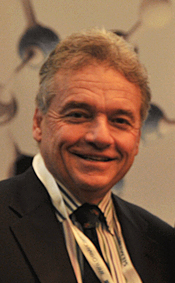
Over the past two decades, Dr. Gold has pioneered the hypothesis of hedonic overeating or pathological attachment to food as an addiction. This work is much less controversial now that many recognize the similarities between great food and compulsive overeating and other process addictions such as gambling and sex. He is frequently interviewed on addictions, overeating, and intervention risk-benefits has been called a prominent addiction researcher by the Wall Street Journal and also interviewed on this subject by USA Today, Newsweek, Forbes Magazine, Bloomberg, Businessweek Men’s Health, and many others. Dr. Gold Co-Chaired a historic Experts Conference at Yale with Kelly Brownell and another at American Society of Addiction Medicine Symposium to focus attention on the great progress that has been made in evaluating and extending this food addiction hypothesis over the past decade. This work has also led to new approaches to treat the obese as well as to prevent overeating in recent post-addicts. In addition to laboratory studies of food, fat, and sugar and proposing the hypothesis relating food with other process addictions, Drs. Nicole Avena & Gold have worked at Princeton University to develop new treatments. Dr. Gold has worked decades on this research question and appears to be making some progress of late (Physiology & Behavior link). Dr. Gold and his research group are currently working Nicole Avena, Ph.D. at Columbia University on “sugar addiction” and drug abuse-like effects. Drs. Brownell and Gold are the Editors of “Food Addiction”, the highly acclaimed textbook published by Oxford University Press. Dr. Gold has mentored many of the nation’s current leaders in overeating, eating disorders and addiction in prevention, education, and research.
Academic Interests
First and foremost, Dr. Gold is a researcher and mentor. He has over 40 years of successfully mentoring young addiction researchers, teachers, and clinicians. Dr. Gold is a mentor of researchers and physicians in full-time academic positions in the NIH and Universities from Chairs to Professors. Dr. Gold’s leadership has been recognized by the Annenberg Foundation which has decided to support other medical students Clerkships and
summer internships. Dr. Gold is a committed teacher has given Grand Rounds at major academic medical centers and spoken at Scientific Meetings in the United States, Europe, and Asia. He is a regular Keynote Speaker at Internal Medicine Annual Meetings, PriMed, Addiction and also Psychiatric meetings and Conventions. He is the author of a number of classic texts, citation classic research articles, and also chapters in the most widely read textbooks and reviews by physicians and medical students. Over the past 35+ years, Gold has written book chapters, practice guidelines, edited textbooks, and developed self-learning modules to increase access to state-of-the-art addiction research and practices. Recently, Dr. Gold has been the author of Performance Enhancing Medications and Drugs of Abuse, also Dual Disorders and a new text on alcohol.
Leadership and Service
Dr. Gold has been a leader at the University, State, National and International level in drug abuse prevention, treatment advocacy and research. He has been a member of various Chair Search Committees, the Admissions Committee, the Curriculum Committee, and the Director of the Alcohol Education Center and Impaired Physicians Task Force.
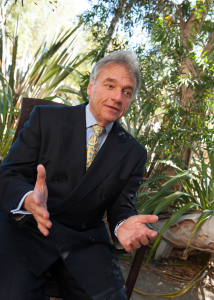 Nationally, Dr. Gold has worked with a variety of governmental agencies concerned with drug use and youth. In addition to work with the White House’s ONDCP, NIDA, NIAAA, and NIH. Dr. Gold has worked for 30 years with the DEA. Dr. Gold has worked for DEA Administrators from Mullen, Bensinger, Lawn to the present day Administrator Michele M. Leonhart to reduce stigma and increase access to treatment.
Nationally, Dr. Gold has worked with a variety of governmental agencies concerned with drug use and youth. In addition to work with the White House’s ONDCP, NIDA, NIAAA, and NIH. Dr. Gold has worked for 30 years with the DEA. Dr. Gold has worked for DEA Administrators from Mullen, Bensinger, Lawn to the present day Administrator Michele M. Leonhart to reduce stigma and increase access to treatment.
Dr. Gold has been an expert who has consulted on drug problems, addiction, and treatment to many governmental agencies, Administrators and Directors. Dr. Gold has been very active in the DEA Museum. Dr. Gold has been a Founding Director of the DEA Museum and Educational Foundation and serves on its Board of Directors. Gold has spoken at DEA Museum and DEA events in DEA HQ, Tampa, New York City, and elsewhere.
Dr. Gold has worked with the Hillary Clinton’s State Department on the Children of Kabul project and presented these and other findings at national, international, and UN meetings. This work, which has been highlighted by Secretary Clinton on the State Department web site is continuing.
Dr. Gold is an Editor of the Journal of Addictive Disease, Editorial Board member of a number of Journals and reviewer for many, many more. He reviews more than 20 journal articles yearly. Dr. Gold is a member of the Betty Ford Institute Board in Palm Springs, California and Washington University’s Institute for Public and Global Health Directors, and also serves on the Board of the Institute for Behavior and Health in Bethesda, Maryland.
Dr. Gold is a Phi Beta Kappa graduate of Washington University in St Louis where he also was awarded the 1989 Distinguished Alumni Award. He has served CASA as an expert panelist on four occasions, most recently on treatment efficacy and parity. He was an Honors Graduate of the University of Florida College of Medicine where he was also AOA and a Wall of Fame award recipient. Dr. Gold was awarded the 2004 Conway Hunter Society Award, The American Academy of Addiction Psychiatry’s Founders Award in 2005, the prestigious annual Nelson J. Bradley, M.D. lifetime achievement award by the NAATP at their 2006 Annual Conference. Dr. Gold has also received awards from DARE and also DEA for decades of volunteer service. Dr. Gold has been elected a member of the American College of Psychiatrists 2010. Dr. Gold has been awarded Exemplary Teaching and Minority Mentoring Awards from the University of Florida College of Medicine and an Inventor Award many times from the University of Florida’s Office of Technology Transfer for the licensing of his patents. He is the 37th University of Florida UFAA Alumni Professor and one of the only such Professors to ever be asked to serve a second two-year term.
Since beginning his career in research at the University of Florida in 1970, he has been the author of over 900 medical articles, chapters, and abstracts in journals for health professionals on a wide variety of psychiatric research subjects and authoring twelve professional books including practice guidelines, ASAM core competencies, and medical textbooks for primary care professionals. He is the author of 15 general audience books. According to a review in the Journal of the American Medical Association (JAMA 272:18, 1996), “Mark S. Gold, M.D. is the most prolific and brilliant of the addiction experts writing today. Dr. Gold has spent his career trying to bridge the gap in medical education and practice with the belief that addictions are diseases and that all physicians have a critical role in prevention and, if that fails, in early identification and prompt treatment.”
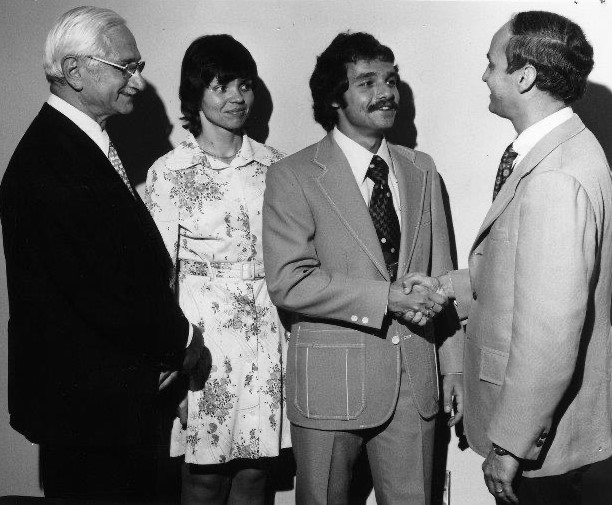
Mark S. Gold 1971 UFCOM Faculty Research Award recipient from UF Dean College of Medicine William Deal MD
Distinguished Alumnus Awards:
• University of Florida, 1984
• Washington University, 1989
• Yale University, 2008
• University of Florida Alumni Distinguished Professor (2011-2013)
Contact Mark S. Gold, M.D.
17th University of Florida Distinguished Alumni Professor
Wikipedia: http://en.wikipedia.org/wiki/
Office Phone: (352) 258-8485
